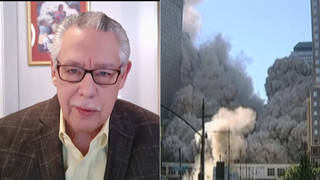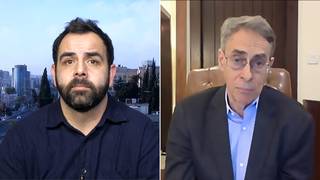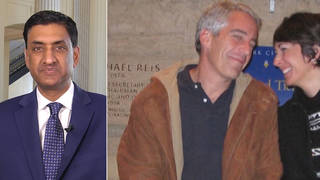
Guests
- Aya Ibrahimformer senior policy adviser at the White House National Economic Council.
Federal Reserve Governor Lisa Cook is suing President Donald Trump to challenge his attempt to fire her from the board of the central bank. A president cannot get rid of Fed officials over policy disagreements, but he can dismiss someone “for cause.” In recent days, Trump’s allies have accused Cook of misrepresentation on her mortgage forms, which Trump cited Monday when demanding her removal. Trump has also repeatedly threatened to fire Fed Chair Jerome Powell as he pushes the central bank to cut interest rates more rapidly.
“The Federal Reserve is meant to be protected from these types of political pressures. It is an independent institution,” says Aya Ibrahim, a former senior policy adviser at the White House National Economic Council, where she covered the financial regulation portfolio and supported Cook’s confirmation. Ibrahim says Cook, the first Black woman to serve on the Fed’s Board of Governors, is an incidental target of Trump’s larger “desire to exert control over all parts of government.”
Transcript
AMY GOODMAN: This is Democracy Now! I’m Amy Goodman, with Juan González.
Federal Reserve Governor Lisa Cook says she’ll file a lawsuit against President Trump’s attempts to fire her. Cook is the first Black woman to sit on the Federal Reserve Board of Governors. Trump is claiming, without evidence, that Cook committed mortgage fraud. Cook’s attorney says the president, quote, “lacks any factual or legal basis” to fire her. Trump has also repeatedly threatened to fire Fed Chair Jerome Powell, who’s been pressured by the president to lower interest rates.
For more, we’re joined here in New York by Aya Ibrahim, former senior policy adviser at the White House National Economic Council, where she covered the financial regulation portfolio and supported Lisa Cook’s confirmation in the Biden administration.
Welcome to Democracy Now! It’s great to have you with us.
AYA IBRAHIM: Thank you.
AMY GOODMAN: Tell us who Lisa Cook is. And for people who don’t really understand what’s going on here, is she a surrogate for President Trump not being able to fire Fed Chair Jay Powell? Explain what’s going on.
AYA IBRAHIM: Well, let’s just start with, as you said, who Dr. Cook is. So, Governor Lisa Cook is a renowned economist. She’s an accomplished economist. She is an expert in macroeconomics and in financial policy. She has had a distinguished career leading up to her nomination in '22 and her confirmation to the Federal Reserve Board of Governors. So, that's who Governor Lisa Cook is.
The president has been very adamant about his desire for the Federal Reserve to cut interest rates, which is their main purview, setting monetary policy for the country. The president would like to see us run the economy very hot, and he sees higher interest rates as an obstacle to that. The Federal Reserve is meant to be protected from these types of political pressures. It is an independent institution. It is a central bank that acts not just as a backstop for our financial system, but for the global financial system writ large. The president has pursued a line of attacks against Chairman Jay Powell and others on the board for many months now in, again, his desire to pressure them into lowering interest rates.
But — and this is key here — the Federal Reserve is an independent entity, and it’s meant to make long-term — it’s meant to make decisions with a long-term view. It’s meant to manage inflation, which up until this point has remained an issue, and to maximize employment. In the absence of an ability to pressure them to move as quickly as he would like, he, the president, is now looking at other avenues to take over control of this, again, independent body.
JUAN GONZÁLEZ: And could you talk about what his powers are here? He can remove a Fed governor for cause, but there has been no actual charges against Governor Lisa Cook. Could you explain what the limitations, by law, of his power are?
AYA IBRAHIM: So, this is really a test of those limitations. Back in May, I believe, the Supreme Court ruled — their Wilcox decision gave the president latitude to remove those who were — to remove independent regulators, so the National Labor Relations Board, the Federal Trade Commission. The Supreme Court gave the president the ability to remove those who were confirmed to those roles, for cause. Whether or not that same approach can be taken for those who are sitting on the Board of Governors at the Fed, that is the open question here. The Federal Reserve Act only stipulates that a governor can be removed for cause. It does not define specifically what cause is. And so, that is another open question.
But at the end of the day, allegations and unfounded allegations of misconduct are not cause. And Governor Lisa Cook and all others who were confirmed to the Board of Governors were confirmed to tenured roles. Right? All of this is part of a design meant to insulate the Federal Reserve as an institution from the types of political pressures and attempts at power grabs that this president is clearly pursuing.
JUAN GONZÁLEZ: And I wanted to ask you about the impact on the economy of this war of the president against the Federal Reserve Board, and, of course, along with his constantly changing tariff proclamations. There’s been analysts, financial analysts, who have noted there’s a huge sell-off of U.S. government treasuries in recent months. Could you talk about the impact on the economy, if there is any?
AYA IBRAHIM: Yeah, no, absolutely. I mean, the defining feature of the U.S. economy, even in times of crisis, is an underlying stability and, more importantly, credibility. So, there is a reason that even, again, in times of financial distress, people turn to U.S. treasuries, they turn to U.S. debt, as it’s seen as a safe haven asset, and so people feel very comfortable putting their money there. They know that — they know that we’re good for it, in other words.
And this president has come in and injected all kinds of questions into what otherwise was a settled matter. And whether it’s the tariff policy, that changes day in and day out — I believe this week a number of countries have suspended shipments into the United States because of a change in tariff rules, something referred to as the de minimis rule. So, previously, packages up to a certain value were allowed into the United States and did not have to go through a process of clearing border processing in the same way that other larger shipments coming in did. Now that has been changed, without any additional resources, without any explanation. And so regular people at home are going to see things that they have otherwise had no problems having shipped now being suspended.
And that is all on top of, again, a very reckless approach to economic policy, which really is dependent on a sense of trust and credibility and belief that the people in charge know what they’re doing. Up until this point, there really was not a question that those at the Federal Reserve knew what they were doing in terms of executing their mandate — managing inflation, maximizing employment and ensuring stability in our economy and in our financial system. This president is upending all of that.
AMY GOODMAN: Can you talk about the significance of Lisa Cook being the first Black woman to sit on the central bank’s board, and what this board is, how many people are on it, why he’s honed in on her?
AYA IBRAHIM: So, again, yes, it is absolutely historically significant that Governor Cook is the first Black woman nominated and confirmed to the Federal Reserve Board of Governors. That being said, again, as much as it is about her, it isn’t about her. She happens to be the target of the president’s ire at this moment, but this is about a much larger issue of the president’s desire to exert control over all parts of government, including those that are, by statute, meant to be independent, for all of the reasons that we have discussed.
The central bank needs to be able to, again, execute its mandate without fear of retribution or targeting by the president. This board is made up of, I believe, five permanent members and seven that rotate from the regional banks. And there is the committee that sets benchmark interest rates. And so, this is about the president’s — again, his desire to take control of this committee, to basically have a stamp of approval on whatever he would like to see happen as it relates to interest rates. But even beyond that, the Federal Reserve maintains an almost unlimited balance sheet. So this is also about an attempt to potentially sidestep Congress in his — in the fiscal policy that he would like to pursue and utilizing the Fed as an avenue for sidestepping Congress as he tries to set policy that they might not be on board with.
JUAN GONZÁLEZ: Yeah, and I wanted to ask you, Aya, this issue of — you’re saying that the Fed not only controls the interest rates, but really it controls the money supply, doesn’t it?
AYA IBRAHIM: Yes.
JUAN GONZÁLEZ: And the impact of the president gaining control of that, as well?
AYA IBRAHIM: Yeah, I mean, that that is the spigot, the money spigot, and the president would like control of the money spigot. He would like to have control over the levers for money supply. And it’s incredibly dangerous, because his interest, politically, is to run the economy as hot as possible. So, you want to be here for the boom. What happens when there’s the inevitable bust? And it is not clear to me that there is a plan or even any concern for what that means for regular working people and everyday Americans who will be left holding the bag.
AMY GOODMAN: So, she’s suing. We just have 30 seconds.
AYA IBRAHIM: Yeah.
AMY GOODMAN: Does that mean she’s going to work?
AYA IBRAHIM: I actually don’t know. Knowing Governor Cook, her main focus is doing the job that she was confirmed to do.
AMY GOODMAN: Aya Ibrahim is former senior policy adviser at the White House National Economic Council.
Next up, FEMA workers have been suspended after they sent a “Katrina Declaration” to Congress to protest the Trump administration rolling back many reforms put in place after the deadly storm 20 years ago this week in New Orleans. We’ll speak with a former FEMA spokesperson who signed the letter. Back in 20 seconds.
[break]
AMY GOODMAN: “New River Blues” by the late folk legend Michael Hurley, performing in our Democracy Now! studio.













Media Options